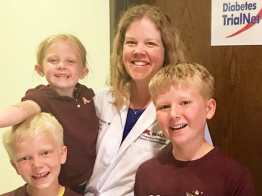
University of Minnesota is one of eighteen type 1 diabetes TrialNet International Clinical Centers at the forefront of type 1 diabetes research. Led by Antoinette Moran, MD, the TrialNet team at University of Minnesota is dedicated to preventing type 1 diabetes and stopping disease progression by preserving insulin production before and after diagnosis.
Our Team

Antoinette Moran, MD

Brandon Nathan, MD

Shannon Beasley, NP

Jose Jimenez-Vega, MD

Jacob Kohlenberg, MD

Beth Pappenfus

Janice Leschyshyn, RN

Kali Johnson, MPH
Study Coordinator
Veronica Jones-Carr, RN
Regional Affiliates
Research Studies
If you have a relative with T1D, you may be eligible for risk screening that can detect the early stages of T1D years before symptoms appear. More
Depending on your risk screening results, you may be eligible for monitoring. We’ll monitor you for disease progression and let you know if you become eligible for a study. More
TrialNet is testing a low dose of the immunotherapy drug anti-thymocyte globulin (ATG) to see if it can delay or prevent type 1 diabetes (T1D) in people ages 6 to 34 who have a 50% risk of clinical diagnosis (Stage 3) within 2 years. Risk is defined by having two or more autoantibodies and abnormal blood sugar (Stage 2), plus at least one high-risk marker (based on test results). In an earlier TrialNet study for people newly diagnosed with T1D, low-dose ATG preserved insulin production and improved blood sugar control for 2 years. Details
If you are diagnosed with T1D while participating in one of our prevention studies, we’re still here for you. You can continue to receive personal monitoring while helping us learn more. More
TrialNet researchers are testing two different treatments – abrocitinib and ritlecitinib – to see if either or both can preserve insulin production in people (ages 12-35) newly diagnosed with type 1 diabetes (Stage 3 T1D). Abrocitinib and ritlecitinib are in a new class of autoimmune treatments called Janus kinase (JAK) inhibitors. Details
TrialNet is testing the safety of a new treatment, NNC0361-0041, in adults diagnosed with type 1 diabetes (T1D) in the past 48 months. This is a Phase 1 study, which means it is the first time this treatment is being tested for safety in people. If this study results in no safety concerns, we plan to conduct a larger study to see if this same treatment can slow down or stop T1D in people at high risk, before clinical diagnosis. More







